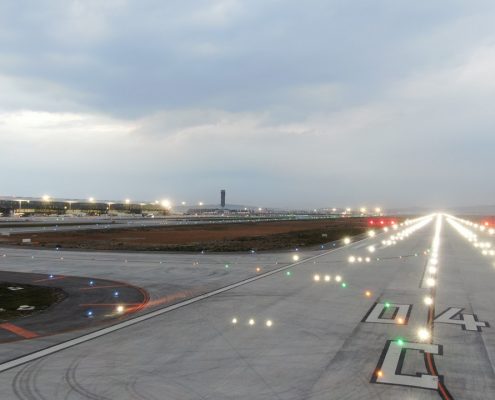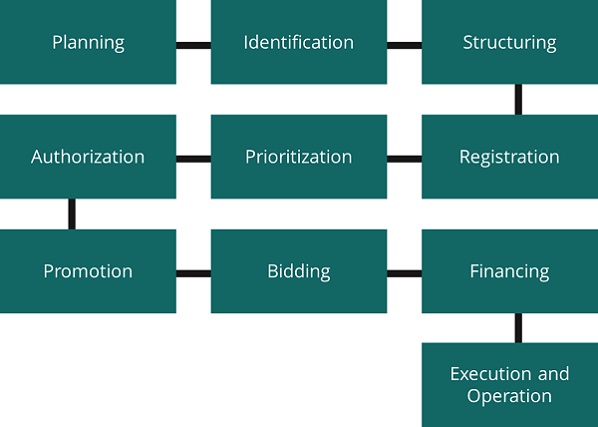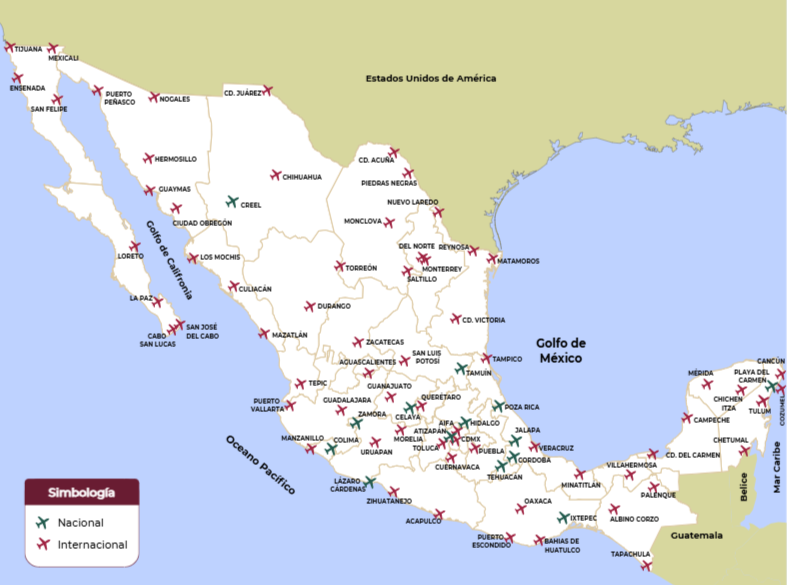Last review: July, 2025
Banobras offers interested parties information on the sector in Mexico with data from various sources in order to provide knowledge on the subject and useful elements for decision-making at the sectoral level. The content presented does not reflect the position of Banobras.
SICT: The Government of Mexico and the private sector will invest 134 billion pesos in airport infrastructure. View document
Current status
The Mexican Airport System (SAM) is comprised of 80 airports—66 international and 14 domestic—along with 1,530 aerodromes and 577 heliports. Of the 80 airports, 35 are concessioned to three airport groups (OMA, ASUR, and GAP), which, together with Mexico City International Airport (AICM), handle 89.7% of passenger traffic and 58.1% of cargo.[1]
Mexico City, Cancún, and Guadalajara account for the highest number of passengers, each hosting one of the country’s three largest airports. Additionally, the airports in Mexico City, Guadalajara, and Monterrey handle the largest share of cargo traffic.

Felipe Angeles International Airport
Airport Groups
- Aeropuertos y Servicios Auxiliares (ASA): 2 domestic airports
- Grupo Aeroportuario Marina: 7 airports; 1 domestic and 6 international (AICM, GACM, and SACM in the process of merging)
- Felipe Ángeles International Airport (AIFA): 1 international airport
- Grupo Mundo Maya (GAFSACOMM): 12 airports; 2 domestic and 10 international
- Grupo Aeroportuario del Pacífico (GAP): 11 international airports
- Grupo Aeroportuario Turístico Mexicano (GATM): 2 international airports
- Grupo Aeroportuario Centro Norte (OMA): 13 international airports
- Private: 3 airports; 2 domestic and 1 international
- Partnerships: 3 international airports
- Grupo Aeroportuario del Sureste (ASUR): 9 international airports
- Others (including state-owned, state, private, and municipal): 11 airports; 4 domestic and 7 international
[1] Federal Civil Aviation Agency (AFAC), 2025.
According to the Airport Law, Article 38, concessionaires, assignees, and airport operators must develop a Master Development Plan, based on national airport system development policies and programs, as well as its interconnection with other modes of transport, in accordance with the Regulations and technical-administrative provisions issued. Once authorized by the Federal Civil Aviation Agency (AFAC), with prior opinion from the Ministry of National Defense or the Ministry of the Navy, as applicable, and the Ministry of Infrastructure, Communications and Transportation (SICT), this plan will become an integral part of the concession title. The Master Development Plan must be reviewed every five years.
*For more information on the airport groups, AFAC, through SICT’s provides the following map:
Institutional Arrangement
In terms of infrastructure, Mexico has a defined strategy that offers investors medium and long-term visibility regarding the development of projects, through a series of plans and programs of national and sectorial scope. To access the information, please consult the following documents:
Communications and Transportation Sector Program 2020-2024
Organizational Structure
Description of the hierarchy and roles of the different entities and actors involved in the sector, including how the different institutions and agencies coordinate and collaborate.
It is the Federal Government agency and authority responsible for the sector, in charge of promoting adequate transportation and communications systems that contribute to the accessibility of services, responding to globalization trends.
A deconcentrated administrative body of the Ministry of Infrastructure, Communications and Transport (SICT) responsible for ensuring that air transportation contributes to regional development, social well-being, job creation, and connectivity. Its purpose is to establish, manage, coordinate, oversee, operate, and regulate the provision of national and international air transportation services, as well as airport, ancillary, and commercial services. Its information includes details on airport concessions carried out in collaboration with other organizations.
Deconcentrated entity of the SICT, in charge of attending to requirements derived from air navigation and air traffic control.
It is a decentralized agency of the Federal Government with its own legal status and assets, created on June 10, 1965, to manage, operate, and maintain airports, as well as to provide ancillary, auxiliary, and commercial services in Mexico. ASA stores, markets, and supplies aviation fuel throughout the country through 52 fuel stations located at various airports nationwide, along with one additional supply point. Every day, 15 million liters are supplied.
The Ministry of the Navy finalized the merger of Grupo Aeroportuario de la Ciudad de México (GACM) and Servicios Aeroportuarios de la Ciudad de México (SACM), with the Mexico City International Airport (AICM) to consolidate the state-owned company Grupo Aeroportuario Marina, with which it will have control of 7 airports in the country.
Mexico City International Airport (AICM) and Airport Services of Mexico City (SACM)
A majority state-owned company responsible for managing, operating and exploiting the Mexico City International Airport, as well as providing airport, complementary and commercial services.
Mexico City Airport Group (GACM).
State-owned company responsible for articulating, coordinating and managing the Metropolitan Airport System.
North Central Airport Group (OMA)
Private concessionaire that operates and manages 13 international airports in the north-central region of Mexico.
Southeast Airport Group (ASUR)
Private concessionaire that operates and manages 9 international airports in the south-southeast region of Mexico.
Pacific Airport Group (GAP).
Private concessionaire that operates and manages 12 international airports throughout the Pacific region of Mexico.
Legal system
The compilation of international treaties, laws, regulations, decrees, agreements and federal, state and municipal provisions shown here are for informational purposes and for ease of reference:
SICT
Public Works and Related Services Law
Airport Law

Felipe Angeles International Airport
Investment cycle
The following section provides an overview of the project development process from initial planning to final execution.

Planning
Based on the objectives and strategies defined in the National Development Plan and the National Infrastructure Program, the SICT prepares short, medium and long-term sector programs for the development of airport infrastructure. The information contained in the Communications and Transportation Sector Program seeks mainly to: i) provide a long-term response to the growing demand for airport services in the Valley of Mexico, ii) supervise the performance of national airlines, iii) formalize bilateral air agreements, iv) certify airports based on international standards, v) train piloting and air traffic control personnel, and vi) update regulations on safety issues.
Identification
Based on the planning documents, the SICT identifies the airport projects to be developed. In the case of Unsolicited Proposals (NSP) for PPP projects, they must be linked to the national and sectoral plans mentioned above.
Structuring
In accordance with applicable legal provisions, AFAC prepares the documentation, studies and projects that may be developed through public-private financing schemes and implements the procedures for contracting them, as well as signing the respective contracts and agreements.
Registration
The SICT sends to the SHCP Investment Unit the request for registration in the portfolio of airport projects that require federal public resources (Federal Expenditure Budget (PEF) or National Infrastructure Fund (FONADIN)).
Prioritization
Projects requiring federal budgetary resources must be analyzed by theIntersecretarial Commission on Public Spending, Financing, and Divestment (CIGDF), which determines the relationship for their inclusion in the PEF. The CIGFD prioritizes such projects based on i) socioeconomic profitability; ii) reduction of extreme poverty; iii) regional development; and iv) concurrence with other investment programs and projects.
Authorization
Projects with PEF resources are authorized by the Chamber of Deputies.
Projects with FONADIN resources are authorized by the decision-making bodies of said trust.
Projects that do not require public resources, the SHCP Investment Unit gives its opinion on the economic viability of the project.
Promotion
In charge of SICT, AFAC and/or state-owned companies.
Bidding
In charge of the AFAC and state-owned companies, which are carried out through CompraNet.
Financing
There are various sources of financing depending on the specific characteristics and financial structuring of each project, such as: the Federal Expenditure Budget (PEF), the National Infrastructure Fund (FONADIN), the National Works and Public Services Bank (BANOBRAS), the National Bank of Foreign Trade (BANCOMEXT), commercial banks, developers, as well as institutional and private investors.
Execution and Operation
It is carried out by airport operators.
Projects
Information on projects in operation within the Mexico Projects platform, which at some stage of the project were considered investment opportunities and do not necessarily have Banobras / Fonadin participation.
Projects in Operation
| Project | Sector | Subsector | Stage | Sustainability | With Ally Networks |
| 0967 Plan de Guadalupe Airport | Transport | Airports | Operation | No | No |
| 0871 Mar de Cortes Airport | Transport | Airports | Operation | No | No |
| 0863 Toluca International Airport | Transport | Airports | Operation | No | No |
| 0862 Los Mochis Airport | Transport | Airports | Operation | Yes | No |
| 0861 Tuxtla Gutierrez Airport | Transport | Airports | Operation | No | No |
| 0860 Queretaro Airport | Transport | Airports | Operation | No | No |
| 0858 Cuernavaca Airport | Transport | Airports | Operation | No | No |
| 0857 Minatitlan Airport | Transport | Airports | Operation | No | No |
| 0318 Mexico City International Airport | Transport | Airports | Operation | No | No |
| 0317 Tapachula Airport | Transport | Airports | Operation | No | No |
| 0316 Oaxaca Airport | Transport | Airports | Operation | No | No |
| 0315 Merida Airport | Transport | Airports | Operation | Yes | No |
| 0314 Huatulco Airport | Transport | Airports | Operation | No | No |
| 0313 Veracruz Airport | Transport | Airports | Operation | No | No |
| 0312 Cozumel Airport | Transport | Airports | Operation | No | No |
| 0311 Villahermosa Airport | Transport | Airports | Operation | No | No |
| 0310 Cancun Airport | Transport | Airports | Operation | Yes | No |
| 0309 Guadalajara Airport | Transport | Airports | Operation | Yes | No |
| 0308 Aguascalientes Airport | Transport | Airports | Operation | Yes | No |
| 0307 Bajio Airport | Transport | Airports | Operation | Yes | No |
| 0306 Hermosillo Airport | Transport | Airports | Operation | Yes | No |
| 0305 La Paz Airport | Transport | Airports | Operation | Yes | No |
| 0304 Mexicali Airport | Transport | Airports | Operation | Yes | No |
| 0303 Puerto Vallarta Airport | Transport | Airports | Operation | Yes | No |
| 0302 San Jose del Cabo Airport | Transport | Airports | Operation | Yes | No |
| 0301 Tijuana Airport | Transport | Airports | Operation | Yes | No |
| 0300 Manzanillo Airport | Transport | Airports | Operation | Yes | No |
| 0299 Morelia Airport | Transport | Airports | Operation | Yes | No |
| 0298 Tampico Airport | Transport | Airports | Operation | No | No |
| 0297 Acapulco Airport | Transport | Airports | Operation | Yes | No |
| 0296 Chihuahua Airport | Transport | Airports | Operation | No | No |
| 0295 Ciudad Juarez Airport | Transport | Airports | Operation | No | No |
| 0294 Culiacan Airport | Transport | Airports | Operation | No | No |
| 0293 Durango Airport | Transport | Airports | Operation | No | No |
| 0292 Monterrey Airport | Transport | Airports | Operation | Yes | No |
| 0291 Mazatlan Airport | Transport | Airports | Operation | No | No |
| 0290 Reynosa Airport | Transport | Airports | Operation | No | No |
| 0289 San Luis Potosi Airport | Transport | Airports | Operation | No | No |
| 0288 Torreon Airport | Transport | Airports | Operation | No | No |
| 0287 Zacatecas Airport | Transport | Airports | Operation | No | No |
| 0286 Zihuatanejo Airport | Transport | Airports | Operation | No | No |
Banobras / Fonadin
Project Finance: In order to support the financing of infrastructure projects and public services, the Project Finance Unit structures financing supported by the granting of loans and guarantees to those projects developed as Public-Private Partnerships and which have their own source of payment from the exploitation of the concession or public contract or from the collection of the service in question. The Public-Private Partnership schemes may be Federal and/or Local, in their different modalities, such as: Concessions, Service Provision Projects (PPS) or Financed Public Works Contracts, among others.

Financing for States and Municipalities and Decentralized Public Organizations: The products and services are designed to meet the infrastructure needs of states, municipalities and their decentralized public organizations, in order to improve the quality of life of the population and increase competitiveness.
Infrastructure is a pillar of development, which is why Banobras has innovative products and services focused on contributing to regional development through the promotion of financial mechanisms to:
Boost investment in infrastructure and public services.
Promote the financial and institutional strengthening of states, municipalities and decentralized public agencies.
To this end, Banobras has the following financing schemes:
Products:
Project Development: Banobras offers services aimed at assisting public sector agencies and entities in the development of infrastructure projects.
Financial structuring of the project:
- Elaborate and/or update studies required by the Public-Private Partnerships Law.
- Support in the review of the bidding conditions and contract model.
- Assist in obtaining financing for the project.
- Assist in the registration process of the project in the portfolio of the Investment Unit of the Ministry of Finance and Public Credit (SHCP).
- Assist in dealing with any observations made by the SHCP Investment Unit.
- Support in the financial closing of the project.
The purpose of the National Infrastructure Fund (Fonadin) is to serve as the Federal Public Administration’s coordination vehicle for infrastructure investment. It has one of the largest road concession networks in the world and manages the granting of financial support for infrastructure development, mainly in the areas of communications, transportation, water, environment, energy, tourism, urban and strategic and priority areas, supporting the planning, promotion, construction, conservation, operation and transfer of infrastructure projects with social impact and economic or financial profitability

It has a wide range of products designed to strengthen the financial structure of the infrastructure projects that the country requires, from the conception to the completion of the projects, providing the following financial instruments that make the projects more attractive for financing with private resources:
Recoverable Support
- Simple Credits
- Subordinated Credits
- Guarantees
- Investments in Venture Capital Funds
- Infrastructure Trust Investments
- Financing of Studies and Advisory Services
Non Recoverable Support
- Contributions for Studies and Consultancy
- Contributions for Projects
- Project Grants
Contact: fonadin.puertos-aeropuertos@banobras.gob.mx
Sustainability
Banobras makes available to interested parties, analysis sheets for the detection of sustainability practices in infrastructure projects, in accordance with the methodological framework “Attributes and Framework for Sustainable Infrastructure” of the Inter-American Development Bank (IDB). Its objective is to highlight sustainable practices, encourage their adoption in future projects and provide relevant information for investors in their economic, environmental, social and institutional dimensions.
To consult the projects that already have a sustainability record, select the “SEARCH CRITERIA>” option in the PROJECTS section, and then select “With Sustainability Analysis”; the projects that have a record will be displayed below.
In addition, Banobras offers an analysis tool that presents the potential relationship of the different infrastructure projects of the Mexico Projects platform with the 17 Sustainable Development Goals (SDGs) of the 2030 Agenda and their targets. This comparative analysis facilitates the use of data according to different criteria, such as the potential impact of projects and sectors against national and global development goals.
The comparison is only made between projects in the same subsector. To select and consult here.
The alignment of a project with the SDGs provides information on the degree of focus on sustainability; it provides a comparison between projects in the same sector and sub-sector and facilitates investment decisions, showing the highest and lowest alignment of projects to the SDGs. Comparative analysis facilitates the use of data according to different criteria, such as the potential impact of projects and sectors against national and global development goals.
In the case of the sector, 16 projects are identified in the platform that have sustainability practices detection sheets, which allows to know, among other things, the projects with more and better alignments to the SDGs. For more information, access the Sustainable Development Goals application:
Greater alignment of the sector:
- SDG 8: Decent Work and Economic Growth
- SDG 9: Industry, Innovation, and Infrastructure
- SDG 13: Climate Action

Menor alineación del sector:
- SDG 14: Life Below Water
- SDG 4: Quality Education
- SDG 2: Zero Hunger
Ally Networks
Banobras, through its Ally Networks application, provides information on companies participating in competitive public procurement processes for infrastructure projects in Mexico, based on official sources such as ComprasMX. It includes details on investment amounts, number of participations in bids, projects awarded, consortiums, and business associations, which allows the user to identify potential actors for the establishment of investments in the country.
To consult the projects that have information on the participating companies, select the option “SEARCH CRITERIA>” in the PROJECTS section, and then select “With applicant companies” at the end of the criteria.
Reference documents:
This section offers documents, reports and reports with technical, statistical and regulatory information on the sector:
Official Statements:
2025
- July 6, 2025 – SICT: The Government of Mexico and the private sector will invest 134 billion pesos in airport infrastructure
- May 8, 2025 – Federal Official Gazette (DOF): AGREEMENT delegating powers to the head of the Undersecretariat of Communications and Transport of the Ministry of Infrastructure, Communications and Transport.




